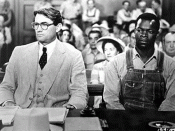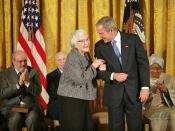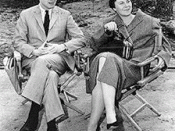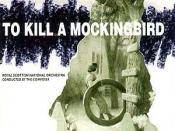Why do people insist on discriminating against others? A person could be intolerant of others due to gender, age, or just the fact that they don't seem to have a place in society. In To Kill A Mockingbird by Harper Lee, the prejudice against individual groups proves unjust due to the town's faulty thinking. (Examples of faulty thinking) The males of Mockingbird underestimate the potential of the women, who are victims of discrimination. (Examples of underestimation of potential) They are not given the chance to voice their opinions on a topic. An example of such is when Jem and Dill want to embark on a journey to the Radleys' and, "[Scout] protested"ÃÂ. They ignore her forewarning and as a result Jem is shot at and loses his pants at the house. While making the snowman, when asked what he is doing Jem simply responds, "You'll see"ÃÂ (Lee 66), and starts barking orders.
Scout, uniformed knows what they're doing, and how to do it. Women are neither emotionally nor physically strong enough to handle the same hardships as men. "Fire suddenly devoured Miss Maudie's house"ÃÂ (Lee 69), as the house burnt to the ground. Now, in most cases a person would broken to pieces because of this, but instead Miss Maudie exclaims, "Always wanted a smaller house. . .I hated that old cow barn"ÃÂ (Lee 75). Atticus barged the meeting, asked to speak to Alexandra, and revealed that, "Tom's dead"ÃÂ (Lee 235). Even under the circumstances Aunt Alexandra, "Looked weary. . .[and] her voice was flat"ÃÂ (Lee 236), but still went out and continued, "as though their [her] regret was. . . losing Calpurnia"ÃÂ (Lee 237). They can't made as good decisions as men. On the jury for Tom's trial are only men for, "women could not handle making such a decision"ÃÂ (Lee 211). Miss Carolina assumed none of the children were able to read. Though Scout was, "Born readin' The Mobile Register"ÃÂ (Lee 17).
As a social misfit the town treats one with prejudice, not realizing the true story but rather the lies community has come to believe. (Examples of community's lies) Socially, outcasts' are considered inept and unable to make educated decisions. Actions of misfits are not understood so are mocked and ridiculed instead. Since they are not involved in the community they are found to be unacceptable.
The towns people showing their biased opinions about the children, fail to credit the youth with a sensitivity for life's hardships. (Examples of failing to credit youth) They do not have mature, developed minds. While sitting in the courtroom there is a realization that, "This ain't fit for Miss Jean Louise or you boys either"ÃÂ, referring to the trial at hand. Not leaving the building and saying, "It's all right"ÃÂ (Lee 173), Jem implies they could all handle it. At a point during the trial there is a request, "that this courtroom be cleared of. . .children"ÃÂ (Lee 174). It is not placed in affect because the judge feels they should be allowed to see and hear what they want. The children are naive and therefore cannot understand what's going on. Atticus tells Scout and Jem to stay home while he goes out, figuring they know not why. Unaware they follow him along with Dill because Jem, "just got this feeling"ÃÂ (Lee 149), and it is a good thing because if not Atticus could of be hurt. As shown when said that, "[Scout] don't know what we're talkin' about. . .this is too old for [her]"ÃÂ , when on the subject of rape. When if fact, "I [she] know[s] every word you're [they're] saying"ÃÂ (Lee 209). Due to their youth they have no concept of the consequences of a person's actions. "Scout's got to learn to keep her head"ÃÂ (Lee 87), is the what Atticus tells her uncle says. Unaware had already had prevented a brawl knowing, "[She] was far too old and too big for such childish things"ÃÂ (Lee 74). Atticus attempts to explain to Scout that he took Tom Robinson's case even tough he, "Were licked a hundred years before we [he] started"ÃÂ (Lee 76). However, Scout does know, and realizes very well the fact and is aware that her father will be talked about.
The town's faulty thinking led to many misconceptions, none of them ever verified. In the book it is never understood, "Why they all couldn't just get along"ÃÂ.





